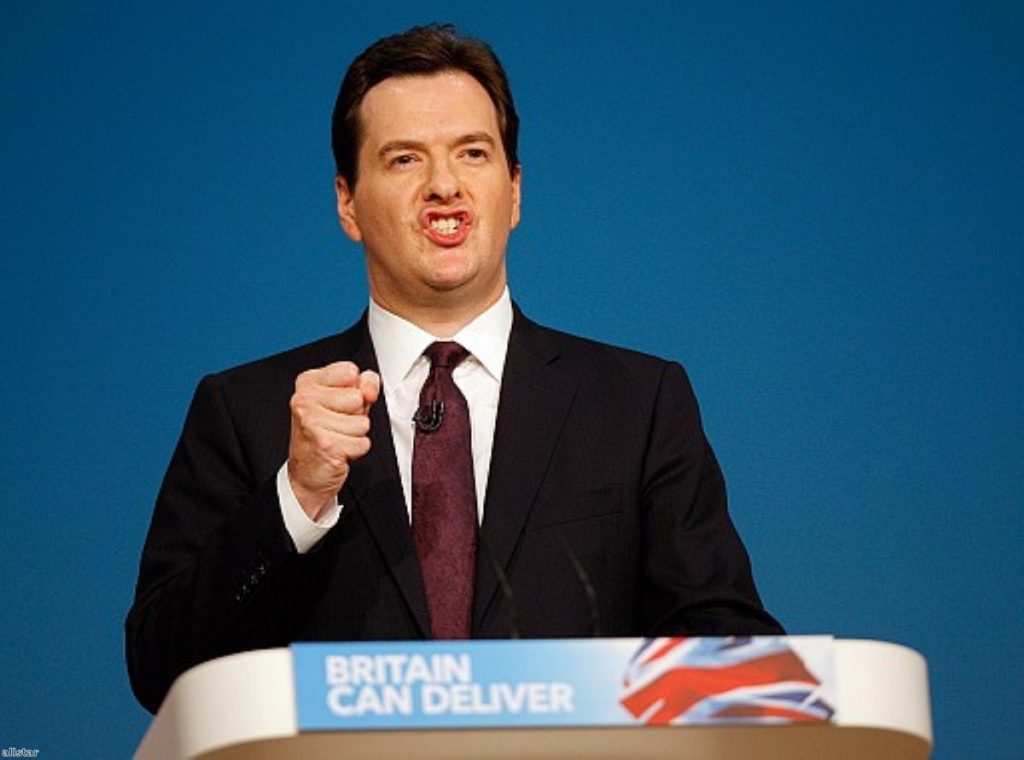Analysis: What did we learn from Osborne’s speech?
There was a lot to learn from Osborne's speech. He showed frayed relations with the Lib Dems, a Tory response to Miliband's 'one nation' speech and a surprising new policy to remove workers rights.
Thatcher's John Lewis
The big policy announcement of the speech – or, at least, the only one not briefed to the press beforehand – took the form of the Beecroft review. Osborne is implementing it, voluntarily, by allowing small firms to become workers' mutuals. An employee would get shares in the start-up company in exchange for signing away his rights. As a sweetener, the shares would have no capital gains tax on them.
Like Miliband's 'one nation' land grab, Osborne's policy steals mutual ownership – usually the territory of the centre – and attaches it to the Beecroft review, which appalled social democrats like Vince Cable. Osborne's approach invites workers to become entrepreneurial – by getting a share of the business and simultaneously losing rights they are in a position where they win big if it goes right but lose badly if it goes pear-shaped. Workers are basically being asked to bet on their careers.


A couple of questions remain though. Anyone can already put their shares in an Isa to avoid capital gains, so why take the risk with your rights? Is the scheme really voluntary? It may be for the firm itself, but a new hire would surely have it thrust upon him as a condition of the job. Also, what happens to the worker who is sacked from an otherwise successful enterprise? Does he lose the shares? Is he forced to sell them? More details will be needed before we can properly evaluate the scheme.
Lib Dem tensions
Osborne admitted the government's programme would be impossible without coalition but much of the rest of his speech gave Lib Dems a hard time. Notice in particular how harshly he put down demands for a mansions tax. "It would be sold as a mansion tax but you'd soon find most of the homes in the country labelled a mansion," he said, to cheers from the Tory rank-and-file. "It's not a mansion tax it's a home tax and this party of home ownership will have no truck with it."
Given Vince Cable, Nick Clegg and Danny Alexander mentioned the mansion tax plans at length –often in their conference speech – most observers assumed they had come to a deal. For Osborne to shoot them down so publically suggests relations continue to break down at the heart of government. This is a particularly galling example, given it takes place between members of the quad (Cameron, Clegg, Osborne and Alexander) where relations are typically cordial.
One Nation
Osborne's lengthy attack against Miliband's use of the 'one nation' theme suggests Cameron plans to stand above the fray while the chancellor works as an attack dog. "It is risible to pretend you can be 'one nation' when all you do is repeat the words over and over again," he said. "[Miliband] wants to pretend he is moving to the centre when he's moving to the left. You can imagine Disraeli's disappointment. Moments after realising there is such a thing as reincarnation he comes back as Ed Miliband."
The jokes were average, but Osborne's approach to them served to arguably make the Miliband speech more threatening. "People marvel at his feat of memory. And so did I. He spoke for over an hour about the problems of Britain and forgot to mention we had a Labour government running the country for over a decade," Osborne continued, giving the opposition leader a degree of praise by virtue of his sustained attack. Ministers will want to avoid focusing on the speech much in the next few days or they may end up contributing to its reputation.
Ashcroft's election campaign
Tory donor Michel Ashcroft recently released research suggested Tories were failing to appeal to the 'strivers' – people who worked hard but had a sneaking suspicion others were getting by on contacts and schooling. Cameron has been using 'strivers' all conference. It's an instant buzzword because it can be used to defend against Miliband's 'one nation' message and challenge the idea the Tories are merely around for the rich.
Osborne gave us some indication of how it would be used in his speech. Modern Conservatives back the owner of the corner shop, the teacher prepared to defy her union to take an after school club or the commuter who leaves home before the children are up, he said. Expect to see a lot more of this.
The chancellor's not for turning
Osborne also confirmed plans to cut another £10 billion from the benefits budget, probably through scrapping housing benefit for unemployed under-25s and reductions to child tax credits. This is dangerous territory. On the one hand he needs another £16 billion in 2015/16 to meet his own fiscal targets, on the other most senior economists are concerned further cuts could scare the markets as demand continues to plummet.
Osborne was steadfast, however. He promised to make the rich pay more tax but offered no details of how he would achieve it, beyond referring to a new crackdown on tax evasion. He's spoken about that before, but little comes from it. Alexander had more details during his conference speech two weeks ago, but even that was unimpressive.
Instead, Osborne stuck to his central message: cutting government spending, creating private sector jobs, encouraging businesses by cutting their taxes. It hasn't worked so far, but the chancellor is not yet for turning.












